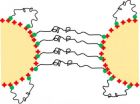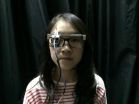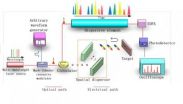(Press-News.org) The guiding philosophy for educating children with disabilities has been to integrate them as much as possible into a normal classroom environment, with the hope that peers' skills will help bring them up to speed. A new study provides empirical evidence that peers really can have an impact on a child's language abilities, for better or worse.
While peers with strong language skills can help boost their classmates' abilities, being surrounded by peers with weak skills may hinder kids' language development.
The findings are published in Psychological Science, a journal of the Association for Psychological Science.
"We were surprised to see the striking differences among children's language skills at the end of the school year when considering those with less-skilled peers and highly-skilled peers," says psychological scientist Laura Justice of the Crane Center for Early Childhood Research and Policy at The Ohio State University, lead author on the study. "In particular, children with disabilities seemed to be very negatively affected by having classmates who were less-skilled."
Previous research suggests that children with disabilities show developmental improvement from exposure to sophisticated language, and that teachers' level of speech sophistication influences children's language growth. Moreover, evidence indicates that peers may improve each other's performance in the classroom. Justice and colleagues hypothesized that classmates' higher level language abilities would promote language growth in children with disabilities.
Six hundred seventy preschoolers participated in the study. Just over half of them had a clinically diagnosed disability, including autism spectrum disorder, language impairment, or Down syndrome. Teachers completed a measure examining each child's language skills at the beginning of the school year, and again at the end of the school year. To determine the level of improvement, the researchers then compared individual children's scores in the spring to the classroom average.
The researchers found that preschoolers with special needs were more influenced by their peers' language skills than were children without disabilities. Children with disabilities whose classmates had weak language skills showed the strongest effects – by spring, their language skills lagged far behind those of typically developing children.
In general, preschoolers whose peers had relatively high language skills showed more improvement in their own language skills over the course of the school year than did children whose peers' skills were not as strong.
Children who started the year with weak language skills made larger gains if their classmates had strong language skills; by the end of the school year, they had scores similar to those of highly-skilled kids with less-skilled peers.
The researchers believe that when kids play together and interact in the classroom, they naturally imitate each other's behaviors, which in turn helps them to develop language skills such as "taking turns in conversation, communicating their needs and wants, and producing narratives."
"If peer effects operate as our work suggests they do, it is very important to consider how to organize children in classrooms so that their opportunities to learn from one another is maximized – and so that young children with disabilities are not segregated into classroom serving only those with special needs," says Justice.
Justice and colleagues conclude that regardless of disability, classrooms in which most children have poor language skills are not ideal. They suggest that since typically developing kids continue to improve their language skills even when they have some less-skilled classmates, administrators should aim for a diversity of skill level in the classroom.
INFORMATION:
Co-authors on the study include Jessica A. R. Logan and Tzu-Jung Lin of The Ohio State University and Joan N. Kaderavek of the University of Toledo.
This work was supported by Institute of Education Sciences Grant R324A080037.
For more information about this study, please contact: Laura Justice at justice.57@osu.edu or Jessica Logan at logan.251@osu.edu.
The article abstract is available online: http://pss.sagepub.com/content/early/2014/07/25/0956797614538978
The APS journal Psychological Science is the highest ranked empirical journal in psychology. For a copy of the article "Peer Effects in Early Childhood Education: Testing the Assumptions of Special-Education Inclusion" and access to other Psychological Science research findings, please contact Anna Mikulak at 202-293-9300 or amikulak@psychologicalscience.org.
Preschoolers with special needs benefit from peers' strong language skills
2014-07-28
ELSE PRESS RELEASES FROM THIS DATE:
Unhealthy habits more than double risk of metabolic syndrome in childhood cancer survivors
2014-07-28
A St. Jude Children's Research Hospital study found that 73 percent of adult survivors of childhood cancer more than doubled their risk of developing metabolic syndrome and related health problems by failing to follow a heart-healthy lifestyle. The results appear in the current issue of the journal Cancer.
Almost 32 percent of the 1,598 adult survivors of childhood cancer in the study had metabolic syndrome, an umbrella term for health risk factors like high blood pressure, abdominal obesity, elevated triglyceride and other abnormalities that often occur together. The ...
Seeing is bead-lieving
2014-07-28
HOUSTON – (July 28, 2014) – Rice University researchers are using magnetic beads and DNA "springs" to create chains of varying flexibility that can be used as microscale models for polymer macromolecules.
The experiment is visual proof that "bead-spring" polymers, introduced as theory in the 1950s, can be made as stiff or as flexible as required and should be of interest to materials scientists who study the basic physics of polymers
The work led by Rice chemical and biomolecular engineer Sibani Lisa Biswal and graduate student Julie Byrom was published this month in ...
Mutations from Venus, mutations from Mars
2014-07-28
Some 15% of adults suffer from fertility problems, many of these due to genetic factors. This is something of a paradox: We might expect such genes, which reduce an individual's ability to reproduce, to disappear from the population. Research at the Weizmann Institute of Science that recently appeared in Nature Communications may now have solved this riddle. Not only can it explain the high rates of male fertility problems, it may open new avenues in understanding the causes of genetic diseases and their treatment.
Various theories explain the survival of harmful mutations: ...
Measuring the smallest magnets
2014-07-28
Imagine trying to measure a tennis ball that bounces wildly, every time to a distance a million times its own size. The bouncing obviously creates enormous "background noise" that interferes with the measurement. But if you attach the ball directly to a measuring device, so they bounce together, you can eliminate the noise problem.
As reported recently in Nature, physicists at the Weizmann Institute of Science used a similar trick to measure the interaction between the smallest possible magnets – two single electrons – after neutralizing magnetic noise that was a million ...
Social network research may boost prairie dog conservation efforts
2014-07-28
Researchers using statistical tools to map social connections in prairie dogs have uncovered relationships that escaped traditional observational techniques, shedding light on prairie dog communities that may help limit the spread of bubonic plague and guide future conservation efforts. The work was done by researchers from North Carolina State University and the National Evolutionary Synthesis Center (NESCent).
"Prairie dogs are increasingly rare and are subject to bubonic plague," says Dr. Jennifer Verdolin, lead author of a paper on the work and an animal behavior ...
Motivation explains disconnect between testing and real-life functioning for seniors
2014-07-28
A psychology researcher at North Carolina State University is proposing a new theory to explain why older adults show declining cognitive ability with age, but don't necessarily show declines in the workplace or daily life. One key appears to be how motivated older adults are to maintain focus on cognitive tasks.
"My research team and I wanted to explain the difference we see in cognitive performance in different settings," says Dr. Tom Hess, a professor of psychology at NC State and author of a paper describing the theory. "For example, laboratory tests almost universally ...
Wearable device for the early detection of common diabetes-related neurological condition
2014-07-28
WASHINGTON, July 28, 2014—A group of researchers in Taiwan has developed a new optical technology that may be able to detect an early complication of diabetes sooner, when it is more easily treated. If the device proves safe and effective in clinical trials, it may pave the way for the early detection and more effective treatment of this complication, called diabetic autonomic neuropathy, which is common among people with both Type 1 and Type 2 diabetes. The condition progressively affects the autonomic nerves controlling vital organs like the heart and gastrointestinal ...
Potential 'universal' blood test for cancer discovered
2014-07-28
Researchers from the University of Bradford, UK, have devised a simple blood test that can be used to diagnose whether people have cancer or not.
The test will enable doctors to rule out cancer in patients presenting with certain symptoms, saving time and preventing costly and unnecessary invasive procedures such as colonoscopies and biopsies being carried out. Alternatively, it could be a useful aid for investigating patients who are suspected of having a cancer that is currently hard to diagnose.
Early results have shown the method gives a high degree of accuracy ...
Gender inequalities in health: A matter of policies
2014-07-28
A new study of the European project SOPHIE has evaluated the relationship between the type of family policies and gender inequalities in health in Europe. The results show that countries with traditional family policies (central and southern Europe) and countries with contradictory policies (Eastern Europe), present higher inequalities in self-perceived health, i.e. women reported poorer health than men. Health inequalities are especially remarkable in Southern Europe countries, where women present a 27% higher risk of having poor health compared to men.
The authors of ...
Serial time-encoded amplified microscopy for ultrafast imaging based on multi-wavelength laser
2014-07-28
Ultrafast real-time optical imaging is an effective and important tool for studying dynamical events, such as shock waves, neural activity, laser surgery and chemical dynamics in living cells. Limited by the frame rate, conventional imaging system such as charge-coupled device (CCD) and complementary metal oxide semiconductor (CMOS) imaging device can not image fast dynamic processes. Last few years, serial time-encoded amplified microscopy (STEAM) technique based on space-frequency mapping combined with frequency-time mapping has been demonstrated as a completely new optical ...






